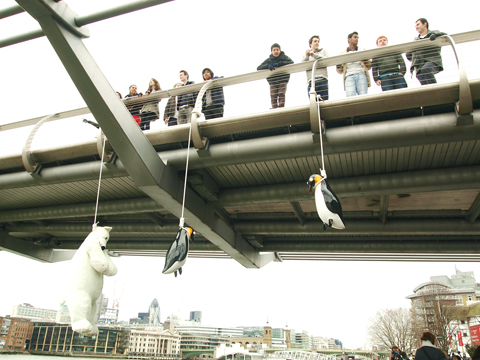“The fate of my country rests in your hands,” said Ian Fry, the Tuvaluan delegate to the UN Climate Change Conference in Copenhagen last year.
TV images of him tearfully pleading for legally binding agreements to fight climate change shocked Taiwanese artist Vincent Huang (黃瑞芳).
Huang, 39, decided to try to help raise awareness of the small Pacific country of Tuvalu, which faces rising sea levels that threaten to make it one of the first victims of global warming.

PHOTO: CNA
On July 17 on Funafuti, Tuvalu’s main island, Huang and two assistants waded out to a reef to erect a small sculpture of a desiccated mermaid made of dried coconut shells and scraggly pieces of palm trees. Later, children swam around the artwork wearing fake shark fins.
“The installation art of the dried Little Mermaid represented the failure of the Copenhagen climate summit. It is surrounded by sharks, a metaphor for the big powers,” Huang told the Central News Agency in Taipei, adding that waves battered the artwork, causing its partial destruction.
After displaying the work for about an hour, Huang burned the piece — titled Den lille havfrue after the Little Mermaid statue in the Danish capital — and collected the ashes in preparation for the next phase of his project.
“I will take ashes to England, the place where the Industrial Revolution began,” he said.
While the eco-art project may have been the first of its kind in Tuvalu, taking on serious issues is not new to Huang.
“An artist can also do something for the world; I learned this while pursuing my master’s degree at Robert Gordon University in Aberdeen, Scotland, 10 years ago,” he said.
Huang has gained international attention with works like his sculpture of a polar bear holding US President Barack Obama’s severed head in its mouth, and his Suicide Penguins series that features penguins hanging from nooses in public places ranging from Taipei to London.
Polar bears and penguins are a recurring theme in Huang’s work — like Tuvaluans, their homes are in danger.
Climate change is not exclusive to any one nation or living creature, Huang said. It does not discriminate.
“Tuvalu will encounter the problem first, which is not fair, since it is a non-industrialized nation where people live a simple life, but have to pay for the failed policies of other countries,” he said.
Huang’s next plan for the Polynesian island is titled Balefire Project in Tuvalu, in which he plans to use an ancient Chinese practice to spread his message.
Huang said he would burn dried coconut shells along the coast of Funafuti during the day, creating old-fashioned distress signals. A more modern version will continue at night, when he plans to aim about 50 green laser lights into the sky from several locations around the island.
The artist said he is planning the project for the end of this month, but his work will not stop there.
“After finishing this piece, I will continue with another project during the Mexico climate change summit to be held at the end of November,” he said.
“I plan to draw the attention of the world to the problem of this island [Tuvalu] and enable people to work together to protect the Earth, which is home to all of us,” he said.

Alain Robert, known as the "French Spider-Man," praised Alex Honnold as exceptionally well-prepared after the US climber completed a free solo ascent of Taipei 101 yesterday. Robert said Honnold's ascent of the 508m-tall skyscraper in just more than one-and-a-half hours without using safety ropes or equipment was a remarkable achievement. "This is my life," he said in an interview conducted in French, adding that he liked the feeling of being "on the edge of danger." The 63-year-old Frenchman climbed Taipei 101 using ropes in December 2004, taking about four hours to reach the top. On a one-to-10 scale of difficulty, Robert said Taipei 101

A preclearance service to facilitate entry for people traveling to select airports in Japan would be available from Thursday next week to Feb. 25 at Taiwan Taoyuan International Airport, Taoyuan International Airport Corp (TIAC) said on Tuesday. The service was first made available to Taiwanese travelers throughout the winter vacation of 2024 and during the Lunar New Year holiday. In addition to flights to the Japanese cities of Hakodate, Asahikawa, Akita, Sendai, Niigata, Okayama, Takamatsu, Kumamoto and Kagoshima, the service would be available to travelers to Kobe and Oita. The service can be accessed by passengers of 15 flight routes operated by

Taiwanese and US defense groups are collaborating to introduce deployable, semi-autonomous manufacturing systems for drones and components in a boost to the nation’s supply chain resilience. Taiwan’s G-Tech Optroelectronics Corp subsidiary GTOC and the US’ Aerkomm Inc on Friday announced an agreement with fellow US-based Firestorm Lab to adopt the latter’s xCell, a technology featuring 3D printers fitted in 6.1m container units. The systems enable aerial platforms and parts to be produced in high volumes from dispersed nodes capable of rapid redeployment, to minimize the risk of enemy strikes and to meet field requirements, they said. Firestorm chief technology officer Ian Muceus said

MORE FALL: An investigation into one of Xi’s key cronies, part of a broader ‘anti-corruption’ drive, indicates that he might have a deep distrust in the military, an expert said China’s latest military purge underscores systemic risks in its shift from collective leadership to sole rule under Chinese President Xi Jinping (習近平), and could disrupt its chain of command and military capabilities, a national security official said yesterday. If decisionmaking within the Chinese Communist Party has become “irrational” under one-man rule, the Taiwan Strait and the regional situation must be approached with extreme caution, given unforeseen risks, they added. The anonymous official made the remarks as China’s Central Military Commission Vice Chairman Zhang Youxia (張又俠) and Joint Staff Department Chief of Staff Liu Zhenli (劉振立) were reportedly being investigated for suspected “serious